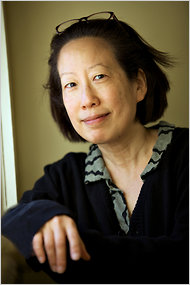WORLD AND TOWN
By Gish Jen
386 pp. Alfred A. Knopf. $26.95
 |
| Gish Jen (Romana Vysatova) |
By DONNA RIFKIND
The New York Times
In three previous novels and a book of short fiction, Gish Jen draped her characters’ troubles in a mood of antic good humor, then gradually allowed those troubles to reveal themselves. In “Typical American,” readers came to understand, through Jen’s adroit storytelling, the disappointments beneath the resilience of the Chinese immigrants Ralph and Helen Chang; in “Mona in the Promised Land,” Jen gave us the identity struggles of the couple’s American-born daughter. Still more complex were the varieties of emotional experience among the Wong family in “The Love Wife,” whose chorus of voices began with an exuberant clamor and ended up somber, reflective and hushed.
This expansiveness helped lend authority to Jen’s tales about the search for a true home in multiethnic America. Her genial family comedies were intimate but never small, and were never only comedies. In an interesting reversal, “World and Town” begins in an entirely different mood. Grief is all over, with a jittery undertone of suspicion; and the novel’s humor, while plentiful, is most often edged in black.
In the spring of 2001, at age 68, Hattie Kong is mired in “a loneliness almost beyond words” after losing both her husband and her best friend to cancer. A retired high school biology teacher, she’s living alone in an apple-cheeked New England mountain town with the dopey name of Riverlake; her journalist son, Josh, checks in by phone every now and then, their conversations drifting into a mournful silence.
Busying herself with a few hobbies, her three dogs and regular walks with a group of local women, Hattie steels herself to endure mostly empty days. Then comes an inescapable disruption: the arrival of a Cambodian family, newly installed in a double-wide trailer on church-owned property just down the hill from Hattie’s house.
“It’s the world come to town,” she imagines her dead husband saying. “As it will, you know, as it will.” How Hattie and the other townspeople wrestle with their responsibility toward this strange, distressed family determines the course of the novel and dramatizes ideas about identity and acceptance that Jen explored in her earlier books. “It’s always been a question, hasn’t it,” one of Hattie’s walking-group friends notes. “Whom America can be America for. And who keeps America, America.”
Wanting to help, Hattie finds herself drawn especially to the 15-year-old daughter, Sophy, who gradually discloses some details about her family’s situation. Years ago, her parents, Chhung and Mum, each witnessed the death of a spouse at the hands of the Khmer Rouge. After uniting in a refugee camp, they adopted an orphan boy whom they named Sarun. Sophy and her two sisters were born in America a few years later, though the sisters now live in foster homes, having been banished because of some shameful sin Sophy recently committed, the girl hints darkly. Sarun has grown into a foul-mouthed teenager with ties to an Asian gang. And now there’s a baby boy as well, named Gift because he has arrived, or so Mum believes, as compensation for three sons who died of starvation in Cambodia.
More unsettling to Hattie than this terrible history are what she perceives as its damaging effects. Sophy and Sarun don’t seem to be going to school. Mum works sometimes as a house cleaner, but her intermittent pay is negligible. Chhung, often drunk, argues constantly and sometimes violently with Sarun. Sophy finds a refuge — or is it, Hattie wonders, an indoctrination? — at a fundamentalist Christian church, drawn more toward its promises of instant rewards than to Mum’s passive Buddhist hopes for reincarnation. “She wanted to be reborn into the right life, her real life,” Jen writes of Sophy. “Her old life was just so wrong.”
Even as Hattie cautions Sophy against the hard sell of the church, she’s forced to examine her own motives. Raised in the Chinese port city of Qingdao, she’s the daughter of an American missionary mother and a father descended from Confucius. Shipped off to her mother’s relatives in Iowa at age 17 to escape the threat of the People’s Liberation Army, Hattie has felt ever since like “a person away from herself,” a permanent exchange student, a stranger. Maybe she’s identifying too strongly with Sophy’s yearning for acceptance to counsel her effectively. How is she to balance the Confucian ideal of guan — detachment — with its counterweight, ren, human-heartedness?
Other Riverlake residents view Sophy’s family with less compassion and more suspicion, imagining the newcomers as one more hostile disturbance to their once pristine landscape (similar to the town hall proposals for a new cellphone tower and a sprawling Value-Mart). Yet how pristine was it, exactly? Who’s to blame for the vanishing family farms, the rash of recent thefts, the decline of religious values, the general malaise? By the time the world comes to town with news of the Sept. 11 terrorist attacks, fear is already a longtime resident.
One of Jen’s greatest strengths is her fluid point of view, which she employs beautifully here, alternating perspectives among Hattie, Sophy and a local man named Everett, whose wife is Sophy’s sponsor at the Heritage Bible Church. Nothing is fixed for these unsettled characters, who keep trying to build new lives in a bewildering world, and whose victories, when they come, bring not rapture but “a defining grace, bittersweet and hard-won.”
Donna Rifkind has written for The Washington Post, The Wall Street Journal and other publications.

























No comments:
Post a Comment